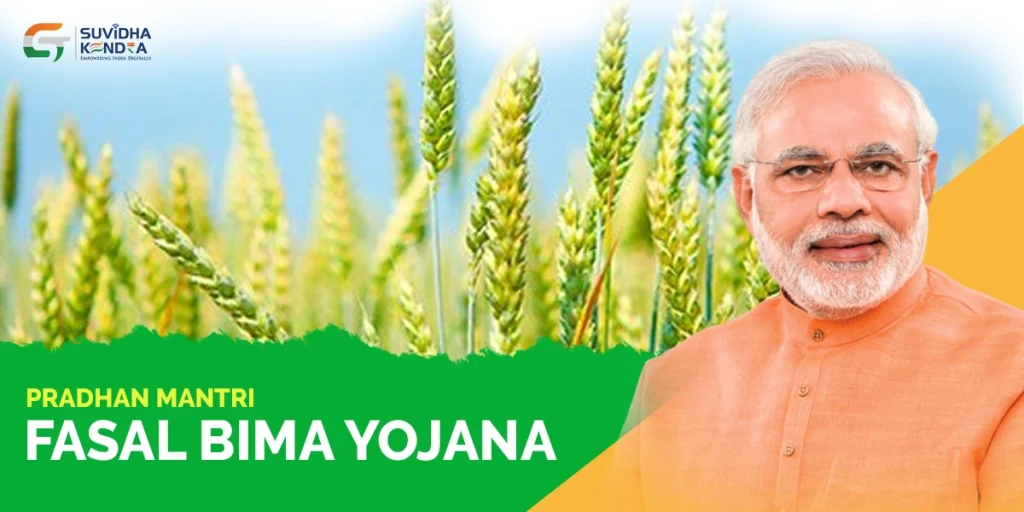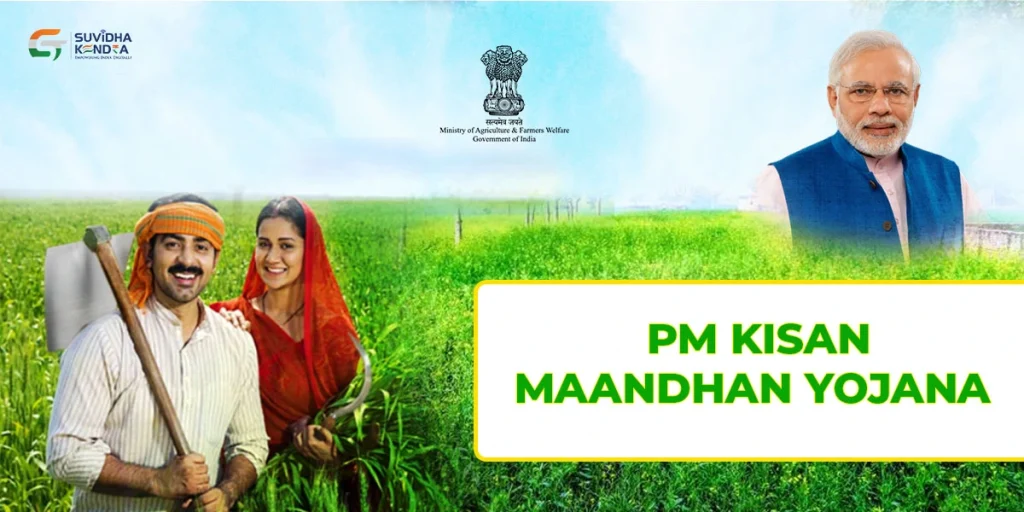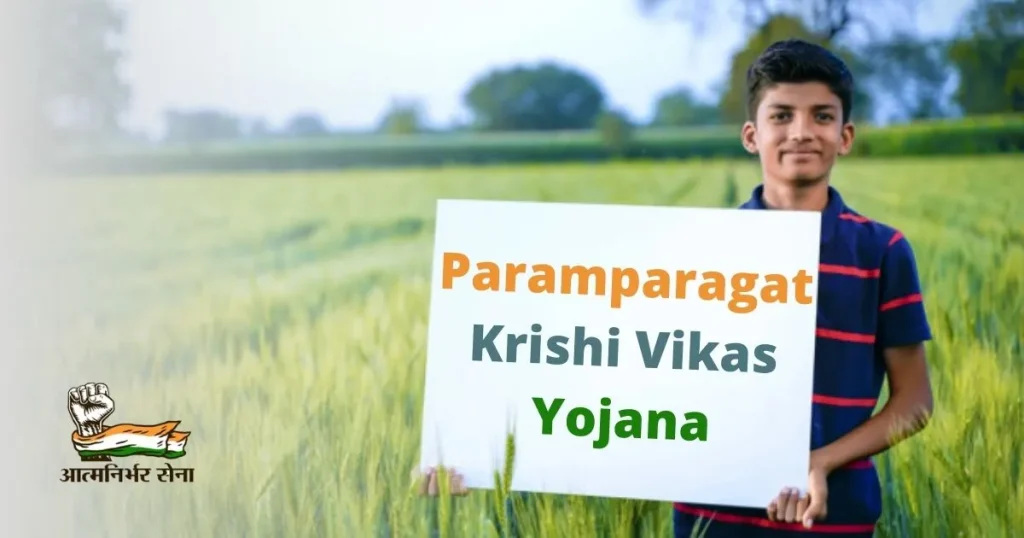Agriculture, with its allied sectors, is the largest source of livelihood in India. 70% of India’s rural households primarily depend on agriculture for their livelihood. As per the Second Advance Estimates of National Income, 2022-23 released by the Ministry of Statistics & Programme Implementation (MoSPI), the share of Gross value added (GVA) of agriculture and allied sectors in the total economy for the year 2022-23 is 18.3%. From the first government itself, Indian governments have always supported the agricultural sector and the farmers through various government schemes. Let’s take a quick glance at the various government schemes for farmers.
1. Pradhan Mantri Kisan Samman Nidhi(PM-Kisan)
The Pradhan Mantri Kisan Samman Nidhi (PM-KISAN) Yojana is one of the farmer welfare government schemes launched by the Government of India. Under this scheme, the government provides a direct benefit of Rs 6,000 per year to all small and marginal farmers in the country. This benefit is provided in three instalments in every 4 months.

Objectives of this Government Scheme
a. Provide financial assistance to small and marginal farmers.
b. Increase the income of farmers.
c. Make farmers self-reliant.
d. Reduce the burden on farmers.
e. Improve the farmers’ standard of living.
Eligibility Criteria
a. The farmer must be a citizen of India.
b. The farmer must be the owner of the land.
c. The size of the farmer’s land should not exceed 2 hectares.
d. The farmer must have a bank account.
How to Apply
To avail of the benefits of the PM-KISAN scheme, the farmer has to apply online on the official website of the scheme(https://pmkisan.gov.in/). Along with the application, the farmer has to upload his/her Aadhaar card, bank account details, and land ownership documents.
PM – KISAN is one of the important farmer welfare government schemes, as this will increase the income of the farmers and make them self-reliant.
2. Pradhan Mantri Fasal Bima Yojana(PMFBY)
The Pradhan Mantri Fasal Bima Yojana (PMFBY) is a crop insurance government scheme launched by the Government of India in 2016. The scheme aims to provide financial protection to farmers against crop losses due to natural calamities, pests, and diseases. The scheme is mandatory for all farmers cultivating notified crops in notified areas. The premium for the scheme is shared between the government and the farmers. The government bears 50% of the premium for small and marginal farmers, while the farmers bear the remaining 50%. This is one of the best government schemes that provides coverage against crop losses due to drought, flood, hailstorm, cyclone, pests, and disease. The scheme also provides coverage against post-harvest losses due to fire, theft, and other unforeseen events.

The scheme is administered by the National Agricultural Insurance Company (NIAC) and its subsidiaries.
Objectives of the Government Scheme
a. To provide financial protection to farmers against crop losses due to natural calamities, pests, and diseases.
b. Reduce farmers’ vulnerability to crop losses.
c. Improve the income of farmers.
d. Stabilize the agricultural sector.
e. Promote sustainable agriculture.
Eligibility Criteria
- The farmer must be a cultivator or a sharecropper on the insured land.
- Farmers must have a valid and authenticated land ownership certificate or a valid land tenancy agreement.
- The farmer must have applied for insurance coverage within the prescribed time frame, which is generally within 2 weeks of the start of the sowing season.
- They must not have received any compensation for the same crop loss from any other source.
- They must have a valid Kisan Credit Card (KCC) or obtain one within six months of enrolment.
- The farmer should have a valid bank account and provide details of their bank account, along with a valid identity proof, at the time of enrolment.
Documents Needed
- Passport-size photograph of the farmer
- Identity proof of the farmer (Aadhar card, PAN card, Voter ID, Driving license, or Passport)
- Address proof of the farmer (Aadhar card, Voter ID, Driving license, or Passport)
- If the field is owned by the farmer, the ‘Khasra’ paper and account number needs to be kept together
- In case the crop is only sown in the field, evidence for the same needs to be presented
- As evidence, the farmers should get a letter written from people such as Pradhan, Sarpanch, Goan Pradhan, Patwari, etc.
How to Apply
a. Visit the official website of PMFBY (https://pmfby.gov.in/)
b. Click on Farmer Corner
c. If you do not have an account on the website, click on Guest Farmer. Fill in all the details correctly and click on submit. Your account will be created.
d. Fill out the form in the insurance scheme and click on submit.
If you are an already registered farmer, skip step c and click on login for farmer and proceed further with filling out the insurance scheme form.
How to Apply for a Claim
If crops get ruined due to a natural calamity like a typhoon, flood, storm, drought, natural fire, etc., then inform the insurance company within 72 hours. After the claim assessment, insurance money will be transferred to the bank account.
The PMFBY scheme has helped in reducing the farmers’ vulnerability to crop losses and has helped to improve their income.
3. Pradhan Mantri Krishi Sinchai Yojana(PMKSY)
The Pradhan Mantri Krishi Sinchai Yojana (PMKSY) is a centrally sponsored scheme launched by the Government of India in 2015. The scheme aims to provide financial assistance to farmers for the installation of micro-irrigation systems. This is one of the government schemes which is open to all farmers who own less than 2 hectares of land. The financial assistance is provided in the form of a loan, which is to be repaid over a period of 5 years. The loan is interest-free for the first two years.

PMKSY is an umbrella scheme, consisting of two major components being implemented by the Ministry of Jal Shakti, namely, the Accelerated Irrigation Benefit Programme (AIBP), and Har Khet Ko Pani (HKKP).
HKKP, in turn, consists of four sub-components: (i) Command Area Development & Water Management (CAD&WM); (ii) Surface Minor Irrigation (SMI); (iii) Repair, Renovation and Restoration (RRR) of Water Bodies; and (iv) Ground Water (GW) Development.
Objectives
a. To provide financial assistance to farmers for the installation of micro-irrigation systems.
b. Increase the adoption of micro-irrigation systems.
c. Improve the efficiency of water use.
d. Increase crop production.
e. Reduce the cost of production.
f. Improve the quality of produce.
g. Increase the income of farmers.
h. Reduce the burden on farmers.
i. Improve the standard of living of farmers.
Eligibility Criteria
- Farmers of any division or class are eligible for PMKSY.
- The farmers must own the land to avail maximum benefit of the scheme.
- People who belong to Self-help organisations (SHOs), groups of producer farmers, and trust cooperative societies can participate in the scheme after PMKSY registration.
- Farmers who work and cultivate on rented/leased land can also go for PMKSY registration.
- Only Indian citizens can apply for the Pradhan Mantri Krishi Sinchai Yojana.
How to Apply
Farmers can apply for the scheme either online or in offline mode. The subsidy is released to the beneficiary electronically through the mechanism of Direct Benefit Transfer (DBT). The subsidy payable to the beneficiary will be limited to an overall ceiling of 5 hectares per beneficiary.
Documents Needed
- Aadhaar Card
- Proof of Address
- State Domicile Certificate
- Passport Size Photographs
- Mobile Number
- Bank Account Passbook
- Papers of Agricultural Land
- Certificate of House
4. Pradhan Mantri Kisan Maandhan Yojana(PMKMY)
Pradhan Mantri Kisan Maandhan Yojana (PM-KMY) is a voluntary and contributory pension scheme for small and marginal farmers in India. The scheme is meant for old age protection and social security of Small and Marginal Farmers (SMF). This is one of the government schemes which was launched in September 2019 by the Prime Minister and is still available for all farmers.

To join the scheme, farmers need to open a pension account with the Life Insurance Corporation of India (LIC). The minimum monthly contribution to the scheme is Rs. 55 and the maximum monthly contribution is Rs. 200. The contribution amount is fixed for the entire period of 20 years or until the farmer reaches the age of 60 years, whichever is earlier. After the farmer reaches the age of 60 years, the farmer will start receiving a monthly pension of Rs. 3,000 and the pension will be paid for the rest of the farmer’s life. If the farmer dies, the spouse of the farmer shall be entitled to receive 50% of the pension as a family pension. Family pension applies only to spouses.
Objective
The main objective of the PM-KMY is to provide a guaranteed monthly pension of Rs. 3,000 to small and marginal farmers after they reach the age of 60 years.
Eligibility Criteria
a. For Small and Marginal Farmers.
b. Entry Age between 18 to 40 years.
c. The applicant should have cultivable land up to 2 hectares as per land records of the concerned State/UT.
How to Apply(Online)
1: The Eligible SMFs desirous of joining the scheme shall visit the nearest Common Service Centre (CSC).
2: The following are the prerequisites for the enrolment process:
- Aadhaar Card
- Savings Bank Account Number along with IFSC Code (Bank Passbook or Cheque Leave/book or copy of bank statement as evidence of bank account).
3: Initial contribution amount in cash will be made to the Village Level Entrepreneur (VLE).
4: The VLE will key in the Aadhaar number, Name of the subscriber, and Date of birth as printed on Aadhaar card for authentication.
5: The VLE will complete the online registration by filling up the details like Bank Account details, Mobile Number, Email Address, Spouse (if any), and Nominee details will be captured.
6: The system will auto-calculate monthly contributions payable according to the age of the Subscriber.
7: The subscriber will pay the 1st subscription amount in cash to the VLE.
8: Enrolment cum Auto Debit mandate form will be printed and will be further signed by the subscriber. VLE will scan the same and upload it into the system.
9: A unique Kisan Pension Account Number (KPAN) will be generated and a Kisan Card will be printed.
Documents Required
a. Aadhaar Card.
b. Savings Bank Account / PM-Kisan Account.
5. Soil Health Card Scheme(SHC)
Soil health card (SHC) is one of the different government schemes promoted by the Department of Agriculture & Co-operation under the Ministry of Agriculture and Farmers’ Welfare. It is being implemented through the Department of Agriculture of all the State and Union Territory Governments. The scheme aims to provide farmers with a detailed analysis of the nutrient content of their soil, along with recommendations for how to improve soil health and productivity.

SHC is a printed report that a farmer will be handed over for each of his holdings. It will contain the status of his soil with respect to 12 parameters, namely N, P, K (Macro-nutrients); S (Secondary- nutrient); Zn, Fe, Cu, Mn, Bo (Micronutrients); and pH, EC, OC (Physical parameters). Based on this, the SHC will also indicate fertilizer recommendations and soil amendments required for the farm.
Under the SHC scheme, a soil sample is collected from each farmer’s field and sent to a laboratory for analysis. The laboratory tests the soil sample for 12 different parameters, including:
- Nitrogen (N)
- Phosphorus (P)
- Potassium (K)
- Sulphur (S)
- Zinc (Zn)
- Iron (Fe)
- Copper (Cu)
- Manganese (Mn)
- Boron (Bo)
- pH
- Electrical Conductivity (EC)
- Organic Carbon (OC)
Based on the soil analysis results, the laboratory will issue a Soil Health Card to the farmer. The Soil Health Card will contain the following information:
- The nutrient status of the soil
- Recommendations for improving soil health
- The type and quantity of fertilizers and other amendments that the farmer should apply to the soil
How to Register(Online)
Step 1: Click the Registration tab on the Soil Health Card Scheme’s Official website. This will open the registration form.
Step 2: Fill out the online registration form and get the unique registration number.
The forms must be submitted online. Farmers can verify the status of their soil samples on the website (https://www.soilhealth.dac.gov.in/home) later. They are not required to log in. They can check the condition of the soil by selecting their village name, sub-district, district, state, name, and soil registration number. Farmers can also print their Soil Health Card from the Internet after registration and certification by the government. There is a tab called ‘Print Soil Health Card,’ and you may get your card in either English or Hindi by clicking on it.
Required Documents for Registration
- Aadhar card
- Address proof
- Passbook copy
- Registration form
6. Pradhan Mantri Annadata Aay Sanrakshan Abhiyan(Pm-Aasha)
Pradhan Mantri Annadata Aay Sanrakshan Abhiyan (PM-AASHA) is an umbrella scheme to ensure a Minimum Support Price (MSP) to farmers. It comprises the erstwhile Price Support Scheme (PSS) with certain modifications and the rolling out of new schemes of the Price Deficiency Payment Scheme (PDPS) and the pilot of the Private Procurement and Stockist Scheme (PPSS). The objectives of PM-AASHA are to ensure minimum prices to farmers for their produce, which will help to stabilize their income and ensure their food security. This government scheme is open to all farmers who grow notified crops, such as wheat, rice, pulses, oilseeds, and sugarcane. The government will provide a minimum price for each crop, which will be based on the cost of production and the market price.

Components
The three components outlined under the scheme are aimed towards enhancing agricultural productivity and reducing the cost of cultivation which will enable boosting and securing farmer’s income in the long run.
- Price support scheme (PSS)
- Price Deficiency Payment Scheme (PDPS)
- Pilot of private procurement and stockist scheme (PPSS)
Objectives
- To ensure fair prices for farmers and their products by strengthening the procurement process.
- To improve the physical procurement of pulses, oilseeds, and copra.
- To fill gaps in the MSP-Minimum Support Price.
- To strengthen the procurement system and close the gaps.
- To significantly increase the farmer’s income.
Functioning of the Scheme
The minimum support price will act as a floor price below which crop procurement can’t happen. The government will fix the minimum support price (MSP). Food corporation of India (FCI) and National Agricultural Cooperative Marketing Federation of India (NAFED) are the two government nodal agencies undertaking the procurement operations. State governments can also participate in the procurement operations.
- Procurement centres are set up to buy crops directly from farmers at the announced MSPs. These centres include grain markets, market yards, and villages in the farming clusters.
- Crops are purchased from farmers at the notified MSPs. Payment is made directly into the bank accounts of farmers immediately after the sale.
- The government bears the difference between the economic cost of procuring crops and their MSPs. This cost is shared between the centre and the state governments.
- The procured food grains under the scheme are used for operations under National Food Security Act and other welfare schemes.
This is one of the government schemes that primarily focuses on procurement from small and marginal farmers.
7. Paramparagat Krishi Vikas Yojana(PKVY)
Paramparagat Krishi Vikas Yojana (PKVY) is one of the government schemes launched in 2015 by NDA government to promote organic farming. PKVY aims at supporting and promoting organic farming, in turn resulting in the improvement of soil health.

Under the PKVY, the government provides financial assistance for a variety of activities, including:
- Conversion of existing farms to organic farms
- Establishment of new organic farms
- Training of farmers on organic farming practices
- Promotion of organic products
Objectives
- Promote natural resource-based integrated and climate-resilient sustainable farming systems that ensure maintenance and increase of soil fertility, natural resource conservation, on-farm nutrient recycling and minimizing dependence of farmers on external inputs
- In order to reduce the cost of agriculture through sustainable integrated organic farming systems thereby enhancing farmer’s net income per unit of land
- To sustainably produce chemical-free and nutritious food for human consumption
- Protect the environment from hazardous inorganic chemicals by adopting of eco-friendly low-cost traditional techniques and farmer-friendly technologies
- Empower farmers through their own institutional development in the form of clusters and groups with capacity to manage production, processing value addition and certification management
- Make farmers entrepreneurs through direct market linkages with local and national markets.
Eligibility
All farmers/institutions are eligible to apply. However, the maximum land holding is 2 hectares
How to Apply(Online)
- Go to the official website of Paramparagat Krishi Vikas Yojana.
- Click on the Apply Now option on the homepage.
- An application form will pop up.
- Enter all the important information asked in the application form like your name, mobile number, email id, etc. and upload all the important documents.
- Click on the submit option.
For more information on government schemes like this click here.